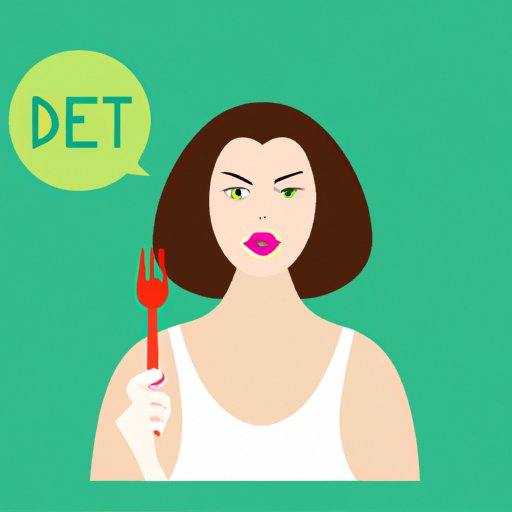
Introduction
Dieting has become a ubiquitous term in our modern society. Everywhere we look, we encounter information on the latest fad diets, weight-loss plans, and nutritional guidelines. With so much information out there, it can be challenging to understand what dieting really means and how to approach it in a healthy and sustainable way. In this article, we will explore the true meaning of dieting and why it’s essential to develop a healthy relationship with food. We will break down the misconceptions surrounding dieting, explore various interpretations of the term, and provide practical tips for developing a healthy and sustainable eating plan.
Understanding the Basics: What Does ‘Diet’ Actually Mean?
The term “diet” generally refers to the set of food and drinks that a person consumes regularly. The primary purpose of a diet is to provide the body with the nutrients it needs to function correctly. Different types of diets serve various purposes, such as therapeutic diets designed to manage medical conditions, weight-loss diets, and maintenance diets designed to help people maintain a healthy weight once they have reached their target.
Regardless of the type of diet, it is essential to have a balanced and diverse selection of foods. Our bodies need a variety of nutrients to function correctly, and an imbalanced diet can lead to nutritional deficiencies, weight gain, and a range of health problems.
Breaking Down the Misconceptions: The True Meaning Behind a ‘Diet’
The media and popular culture have created numerous misconceptions about the term “diet.” Many fad diets promise unrealistic and rapid weight loss and claim to be the ultimate solution to achieving the perfect body. The reality is that these diets can be harmful and typically do not lead to sustainable results.
It is crucial to understand the real meaning behind a “diet” and to develop a sustainable and healthy approach to eating. This does not mean that we should not strive to improve our health and manage our weight, but rather that we need to be mindful of making healthy choices that we can maintain over the long term.
Why Our Perception of ‘Diet’ Has It All Wrong
In addition to misconceptions created by the media and popular culture, societal pressures have also contributed to a negative perception of dieting. We are bombarded with messages about the “ideal” body shape and size, which can contribute to disordered eating behaviors and body dissatisfaction.
To develop a healthy relationship with food, it is essential to shift our mindset away from dieting as a means of achieving a specific body shape or size and towards the goal of promoting our overall well-being. We need to view food as fuel for our bodies and prioritize our nutritional needs over societal pressures.
The Many Interpretations of ‘Diet’: A Comprehensive Guide
The term “diet” can have various meanings depending on the context in which it is used. For example, a weight-loss diet would be different from a diet designed to manage a particular medical condition. It is essential to understand these different interpretations of the term and how they can affect our approach to dieting.
By having a comprehensive understanding of the term “diet,” we can make informed decisions about our eating habits that support our unique needs and preferences. Personalization is key when it comes to developing a sustainable and healthy eating plan that can be maintained over the long term.
Dieting Demystified: The Importance of Knowing What It Really Means
By now, it should be clear that dieting is not just about losing weight or achieving a specific body shape or size. Rather, it is about developing a healthy and sustainable relationship with food that supports our overall well-being.
When it comes to creating a healthy eating plan, education is essential. By knowing what a diet really means and how it can be tailored to our unique needs and preferences, we can make informed decisions about our food choices. This, in turn, can promote good health and prevent a range of chronic illnesses.
Practical tips for creating a sustainable and healthy eating plan include selecting a variety of nutrient-dense foods, tracking your intake, avoiding processed foods, and listening to your body’s hunger and satiety signals.
From Nutrition to Weight-loss: The Different Definitions of ‘Diet’
Different goals can affect our approach to dieting. For example, someone with a medical condition may need to follow a therapeutic diet to manage their symptoms, while someone looking to lose weight may follow a weight-loss diet.
It is essential to consider both nutritional needs and weight loss/gain goals when creating a diet plan. This means prioritizing nutrient-dense foods, avoiding processed foods, and tracking your intake. There are many resources and tools available for individuals looking to develop a personalized and sustainable eating plan, such as consulting with a registered dietitian or using online tracking tools.
Conclusion
In conclusion, dieting is a term that encompasses much more than just weight loss or achieving a particular body shape or size. It is about developing a healthy and sustainable relationship with food that supports our overall well-being. By breaking down the misconceptions surrounding dieting, understanding the various interpretations of the term, and developing practical tips for creating a healthy and personalized eating plan, we can take a proactive approach to our health and well-being.
Ultimately, it is essential to adopt a balanced and diverse approach to eating that prioritizes our nutritional needs and supports a healthy and active lifestyle.





